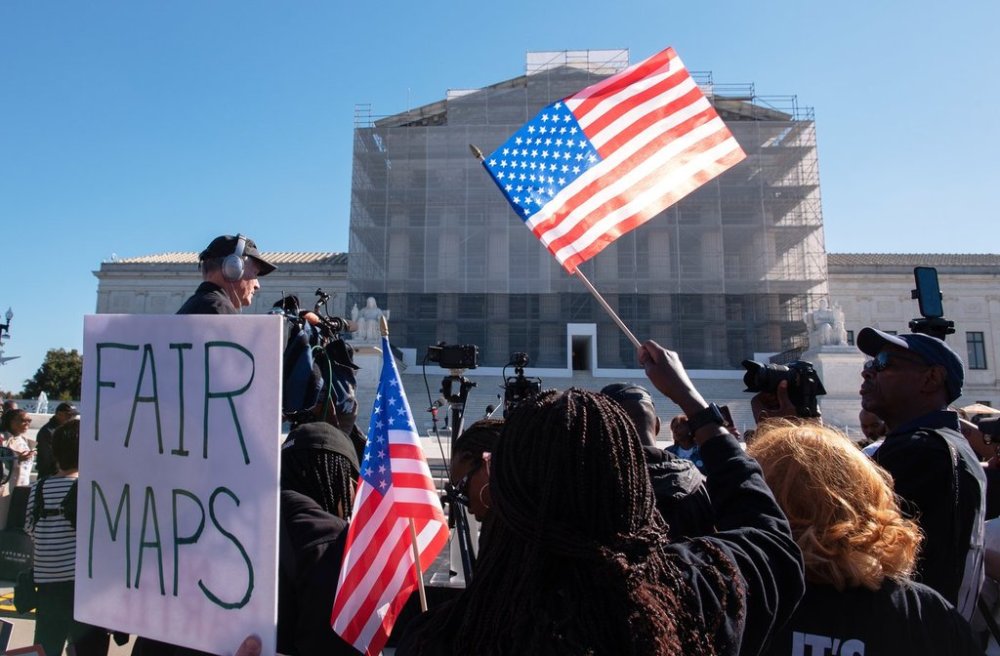World
Supreme Court Case Raises Fears of Diminished Minority Representation

The Supreme Court’s recent oral arguments in the case of Louisiana v. Callais have sparked significant concerns regarding the future of minority representation in American politics. As justices scrutinize the constitutionality of Section 2 of the Voting Rights Act of 1965, many lawmakers and civil rights advocates fear that the progress made over decades could be severely undermined.
For years, the Voting Rights Act has been instrumental in dismantling barriers that have historically disenfranchised racial minority communities in the United States. The Act prohibits discriminatory voting practices and has facilitated the election of diverse representatives across various levels of government. However, skepticism from several justices regarding the provisions of the Act has raised alarms among minority leaders.
During the oral arguments held on March 15, 2024, Rep. Cleo Fields, who represents Louisiana’s congressional district at the center of the case, expressed his concerns in an interview with the Associated Press. He emphasized the potential ripple effects of a ruling that could weaken Section 2, stating, “If they do away with Section 2, they know the ripple effect that’s going to have all over this nation.” Fields remains cautiously optimistic but acknowledges the stakes involved.
Since the enactment of the Voting Rights Act, communities of color have transformed political landscapes previously dominated by white supremacy. The Act has empowered individuals to gain representation in state legislatures and Congress, fostering a more pluralistic democracy. Notable institutions such as the Congressional Black Caucus have emerged, advocating for the interests of Black Americans and shaping national policy.
The current legal challenge has drawn attention to the potential consequences of gerrymandering and redistricting efforts, particularly in states like Texas. Rep. Yvette Clarke, chair of the Congressional Black Caucus, voiced her concerns regarding these practices, describing them as “blatant targeting” of Black lawmakers. She emphasized that the outcome of the case could impact generations to come.
Supporters of the Voting Rights Act argue that its protections are essential to maintaining a representative democracy. Rep. Troy Carter warned that a sweeping decision against the Act could lead to a weakened democracy, stating, “A representative form of government means it should look like its people.”
The Voting Rights Act is widely regarded as a hallmark of the Civil Rights movement, having abolished discriminatory practices such as poll taxes and literacy tests. It affirms the constitutional right to vote and enables federal oversight of state and local voting laws. However, various Supreme Court rulings, including the 2013 case of Shelby v. Holder, have restricted some of these protections, leading to a rise in discriminatory practices in certain jurisdictions.
The questioning from the court’s conservative justices during oral arguments underscored the tension surrounding Section 2. Justice Brett Kavanaugh raised concerns about the implications of requiring governments to address proven violations with race-conscious solutions. In contrast, Justice Ketanji Brown Jackson argued that Section 2 serves merely as a measure to determine when remedial action is necessary, emphasizing its role in ensuring justice.
As the case unfolds, the implications for minority representation remain uncertain. Many advocates, including Rep. Terri Sewell of Alabama, reflected on the historical significance of the Voting Rights Act. Having represented a majority-Black district that witnessed the brutalities of the past, Sewell remarked on the enduring struggle for equal representation and the necessity of vigilance in protecting democratic rights.
The outcome of this case could redefine the political landscape in the United States, raising critical questions about the future of representation for minority communities. As the debate over the Voting Rights Act continues, the commitment to uphold democratic ideals remains a central focus for lawmakers and advocates alike.
-

 Science3 months ago
Science3 months agoToyoake City Proposes Daily Two-Hour Smartphone Use Limit
-

 Health4 months ago
Health4 months agoB.C. Review Reveals Urgent Need for Rare-Disease Drug Reforms
-

 Top Stories4 months ago
Top Stories4 months agoPedestrian Fatally Injured in Esquimalt Collision on August 14
-

 Technology3 months ago
Technology3 months agoDark Adventure Game “Bye Sweet Carole” Set for October Release
-

 World3 months ago
World3 months agoJimmy Lai’s Defense Challenges Charges Under National Security Law
-

 Lifestyle4 months ago
Lifestyle4 months agoVictoria’s Pop-Up Shop Shines Light on B.C.’s Wolf Cull
-

 Technology3 months ago
Technology3 months agoKonami Revives Iconic Metal Gear Solid Delta Ahead of Release
-

 Technology3 months ago
Technology3 months agoApple Expands Self-Service Repair Program to Canada
-

 Technology3 months ago
Technology3 months agoSnapmaker U1 Color 3D Printer Redefines Speed and Sustainability
-

 Technology3 months ago
Technology3 months agoAION Folding Knife: Redefining EDC Design with Premium Materials
-

 Technology4 months ago
Technology4 months agoSolve Today’s Wordle Challenge: Hints and Answer for August 19
-

 Business4 months ago
Business4 months agoGordon Murray Automotive Unveils S1 LM and Le Mans GTR at Monterey









